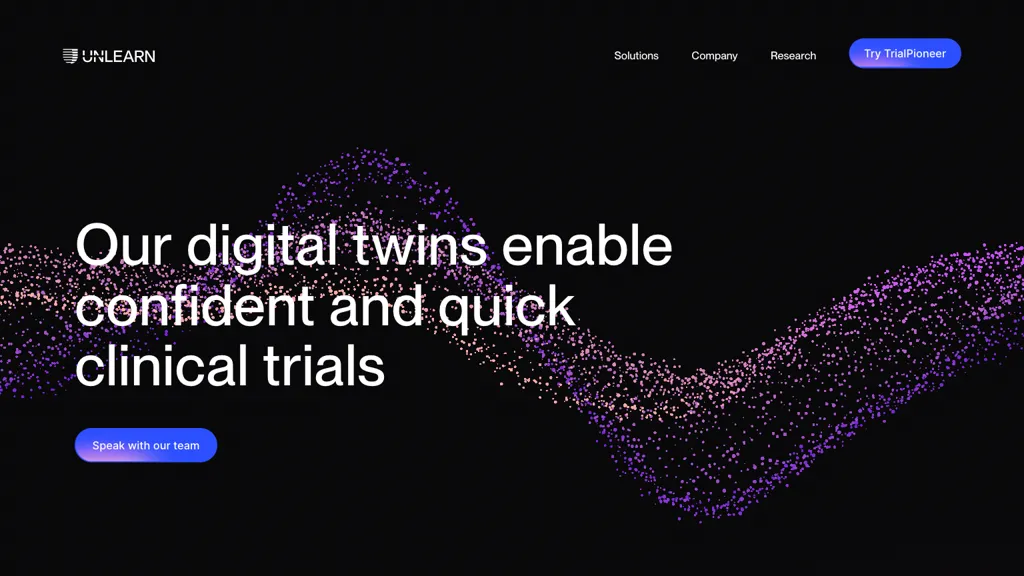What is Unlearn.AI?
Digital twins and Unlearn.AI TwinRCTs revolutionize clinical trials. This new approach accelerates traditional RCTs by deploying patient-specific digital twins that enable faster full enrollment with a reduced number of participants. Medical researchers can also make quicker, more confident decisions using these AI-powered tools.
Amplifying the observation of treatment effects in early studies without necessarily having to increase patient numbers is made possible by this technology. In addition, TwinRCTs boost the chances that study participants will receive experimental treatments through the use of smaller control groups, thereby increasing efficiency and overall success rates in clinical trials.
Unlearn.AI Key Features & Benefits
Unlearn.ai offers a suite of features and benefits targeted at the many needs in the clinical trial ecosystem. Key features include:
- Applications include patient-specific digital twins, accelerated inclusion in clinical trials, better monitoring of the outcomes of treatments, use of smaller control groups, and predictions regarding future health.
- Among the several benefits of using Unlearn.AI include shortened timelines of drug development and early-stage medical research. Small control groups make access of more participants to experimental treatments. Overall, trials can be less costly and shorter with the same confidence in results. Some unique selling points include the need to keep the company above par when optimizing clinical trials.
Unlearn.AI Use Cases and Applications
Unlearn.AI is particularly useful for a variety of key reasons, including the following:
- Speeding up drug development timelines by simulating patient-specific digital twins that optimize treatment strategies. These are used to make faster decisions and start trials sooner.
- Improving early-stage medical research with predictions about the effects of treatments using smaller control groups, streamlining and reducing trial costs while sustaining confidence in outcomes.
- Detailed digital twin simulations to enhance participant selection, improving access by patients to experimental treatments with successful outcomes in shorter study duration.
The industries/sectors using Unlearn.AI are pharmaceutical companies, clinical trial administrators, and patients. This user base finds the technology of Unlearn.AI in optimizing trials and hastening drug development invaluable.
How to Use Unlearn.AI
To begin tapping into the power of Unlearn.AI, follow these steps:
- Create patient-specific digital twins using a variety of tools and data sets provided below. Integrate these digital twins into your clinical trial design in order to accelerate and enhance enrollment.
- Then, by deploying enhanced observation capabilities, monitor the effects of treatments with fewer participants.
- Optimize control groups and predict future health outcomes to further streamline the trial process.
Best practices include routine updating of digital twin data to reflect the most current patient information and leveraging the forecasting tools to plan for future health scenarios. The user interface is intuitive and designed for seamless navigation, assuring even the most unsophisticated technical expertise efficiently uses the platform.
How Unlearn.AI Works
Unlearn.AI has at its heart the best AI algorithms for the generation of virtual patient-specific digital twins. These are in silico models of real patients, which make an attempt at mimicking physiological and pathological conditions. The technology uses previously developed machine learning models that were created from a large dataset to predict the response of a given patient to the use of a certain treatment.
This workflow covers the development of digital twins, their implementation in clinical trials, and finally, using them to predict treatment outcomes. Consequently, it makes the process of making changes to parameters that are in the trials a lot easier because it’s all about making quicker decisions.
Unlearn.AI Pros and Cons
Some pros of the use of Unlearn.AI include:
- Efficiency of conducting clinical trials
- Less reliance on large control groups
- Faster access for experimental treatments to come to patients
- Increased predictive capability of future health outcomes
Some cons include:
- Need for technical capability in initial setup and integration
- Dependence on high-quality data for creating an accurate digital twin
User feedback reports robust satisfaction with the ability of the platform to hasten clinical trials and general efficiency, even if there is some dependence on good management of data.
Conclusion about Unlearn.AI
Unlearn.AI is the next in clinical trials. Its patient-specific digital twin creations help to speed up trial timelines and reduce overall costs while increasing the possibility of success. Everything, from features to benefits, seems to be setting Unlearn.AI apart for consideration as one of the best options in optimizing clinical trials.
In the future, more enhancements are foreseen from Unlearn.AI as its technology proceeds with continuous improvement in keeping with the needs in medical research.
Frequently Asked Questions about Unlearn.AI
What are digital twins?
Digital twins are virtual models reproducing the physiological and pathological conditions of actual patients, where treatment outcomes can be forecast with certainty.
How does Unlearn.AI improve clinical trials?
Unlearn.AI speeds up clinical trials by using digital twins for increasing the observation of treatment effects, reducing large control groups, and accelerating enrollment.
Is Unlearn.AI suited for every clinical trial?
While this diversity in the features of Unlearn.AI is commendable, its success will nevertheless rely on good-quality data and the specifics of a trial.
What support does Unlearn.AI offer?
Full support by way of technical assistance and training is accorded to subscribers by Unlearn.AI with handholding resources on how to derive full value from this platform.










